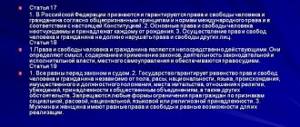Types of property
Let's consider what types of common property spouses can have. These include:
- income received by one or both spouses (here we mean not only wages, but also income from business activities, fees, government payments, financial assistance, compensation for damage, dividends and other money earned during the marriage);
- property acquired by one or both spouses during the period of registered cohabitation (movable property and real estate are taken into account here);
- securities and all other types of participation in business and commercial organizations;
- any other property that appeared during the marriage relationship, with the exception of receiving it as an inheritance or as a gift.
You can learn more about this from the video presented.
Liabilities
Respect for the rights of each family member implies the existence of obligations to him from other participants in family relations. Accordingly, everyone has not only rights, but also responsibilities.
They are also enshrined in the Family Code, but can be additionally stipulated in the marriage contract at the discretion of the husband and wife. The only important point when drawing up such a document is compliance with the principles of preserving the personal rights of each person and preventing him from being placed in a humiliating plight.
The following obligations can be identified:
- The duty to support and care for family members in need . That is, if one citizen becomes disabled for certain reasons (temporary or permanent), the other spouse must provide him with financial support, as well as care and concern for him.
- The obligation to bear family expenses for each family member if he is able to work.
- Responsibility for maintaining a joint household. This includes not only everyday life, but also maintenance and raising children.
It is important to remember that personal rights and obligations cannot be enshrined in a marriage contract; they can only be the subject of personal agreements. These include, for example, staying faithful to each other, sharing household responsibilities at home, and child care arrangements.
These agreements cannot be written down in the contract, since they cannot be enforced. Such rights are granted to every person in Russia by law, and no one has the right to deprive them.
Marriage in our country implies only voluntary marriage, therefore each person is given the right to choose whether to continue living with his spouse or end the relationship.
An important aspect is alimony obligations, which can be assigned even in the event of divorce if one of the spouses is disabled. So, for example, in the event of a divorce after the birth of a child, the working spouse is obliged to pay not only alimony to the baby, but also to his ex-wife until the child is one and a half years old.
What applies to the joint property of spouses
Art. 34 of the RF IC establishes a list of property assets that simultaneously belong to both the husband and his wife if they were acquired after they entered into a marriage.
These include:
- household appliances, furniture, cars, land, buildings (both residential and non-residential) that were acquired through the income of the husband and wife at the same time;
- bank deposits, shares in capital, securities also received through marital income without division;
- other property assets acquired by the spouses during their marriage;
- income from intellectual, entrepreneurial or labor activities;
- pension payments, financial benefits that do not have a separate purpose.
If at any time one of the spouses did not make a monetary and material contribution to their life together (for example, he was on maternity leave, was on sick leave, took care of the house, looked after children), this does not cancel his right to joint marital property .
The concept of the rights and responsibilities of spouses
State registration of relationships assigns a woman and a man new statuses of husband and wife. From this moment on, new legal relations and obligations arise between them.
Legislation in the field of family law defines the main characteristics of the rights and obligations of spouses:
- Equal division. Each member of the new family has the same rights, and the responsibilities of the spouses are also divided equally. Equality can be realized in matters of acquiring property, housing, raising children, and choosing a field of activity.
- Reciprocity. This feature is expressed in the performance of duties towards each other and building relationships based on the principles of mutual respect, mutual care and assistance. In some cases, obligations may not be mutual and they are fulfilled by one of the spouses. This exception is the birth of children.
Property relations, unlike personal ones, are regulated by state legal acts. The Family Code of the Russian Federation legally establishes a regime of joint ownership of property between spouses. Thus, all benefits acquired during marriage are considered joint property, and husband and wife have equal rights to them.
Marital property responsibilities
Property imposes on spouses certain responsibilities that the law requires to be fulfilled on the basis of mutual consent.
The husband and wife must provide financially for both each other and their minor children, as well as their own housing. Property responsibilities include the following:
- purchasing food, cooking;
- purchase of clothing, household and household items, necessary household appliances;
- Regular cleaning of the apartment.
Each spouse must invest in the well-being of the created family - only then will their life together be pleasant and prosperous.
In practice, difficult situations often arise. For example, a woman becomes a mother and at first is not able to go to work. Therefore, she does not bring money into the family. Then the father’s responsibility becomes to provide financially for his wife, child and himself. If the spouse refuses to do this, then you can resolve controversial financial situations yourself or go to court.
Personal (non-property)
Personal rights are generally understood to mean not only the rights relating to the personality of each spouse, but also those that a husband and wife have in relation to their common children. This means the freedom of parents to choose methods of raising their offspring, expressing their will regarding adoption or guardianship over them.
The group of personal rights includes:
- Selecting a surname. A man and a woman getting married choose one of two surnames as a family name or can leave their own. Another option is to combine both surnames. If one of the couple already had a compound surname, then he needs to make a decision about which part of it to include in the new one.
- Occupation. The area of hobbies, main specialty, profession, as well as place of residence are determined by the spouses on the basis of free choice.
- Last name for divorce. If the marriage ends, then everyone has the right to keep the surname acquired during marriage or return to their premarital name.
- Agreement about children. This right gives parents the opportunity to determine the living conditions of their children after a divorce, as well as the procedure for paying alimony, participation in upbringing, and communication with the children of the parent who will live separately.
Personal responsibilities in accordance with the RF IC:
- building family relationships based on mutual assistance and mutual respect;
- making efforts to create well-being in the family;
- caring for the upbringing, development and maintenance of children.
Obligations of this kind are conditioned to a greater extent by moral norms rather than legal ones. Since it is almost impossible to oblige one person to respect another by legislative acts. A person fulfills such obligations at his own request.
The most regulated duty is to ensure the development, education and well-being of children. The Family Code obliges parents to take care of maintaining their health, carry out the educational process and contribute to the development of their children’s personality. Parents who harm children face criminal or administrative penalties.
Personal obligations also include obligations that are aimed at realizing the second spouse’s own rights. This includes taking into account the opinion of the husband or wife in making decisions regarding property, ensuring the spouse’s freedom to choose his surname, profession and place of residence.
Property
The property rights and obligations of spouses are regulated by the legislation of the Russian Federation as a general rule and are divided into two types:
- property relations;
- mutual obligations for maintenance or alimony.
Alimony obligations are expressed in ensuring that the spouse maintains his other half in the event of his incapacity for work. Most often, this obligation is realized in the husband’s material provision for his wife during pregnancy and maternity leave.
If for some reason these requirements are not met, then the party in need has the right to apply to the judicial authorities to file an application for alimony.
Another option for establishing the property rights of spouses is to draw up a marriage contract. This document is concluded between husband and wife at any time during their marriage. The clauses of the contract can be changed by agreement at any time.
Own
The common property of a couple acquired during the marriage relationship includes movable and immovable objects, things, and financial savings. The property rights of spouses do not change under any circumstances, with the exception of the preparation of a marriage contract.
Personal property is not included in common property. This type of property includes:
- benefits received or acquired before state registration of marriage;
- objects given to one of the family members as a gift;
- inheritance;
- items for personal use, except those classified as luxury goods.
The law provides for the transfer of property from one category to another. This is possible if one of the spouses makes financial investments in the property of the other.
Alimony relations
Expert opinion
Smirnov Yuri Andreevich
Legal consultant with 8 years of experience. Specialization: criminal law. Has experience in document examination.
Obligations to provide for a spouse in certain circumstances are regulated by the RF IC. The amount of alimony for the maintenance of a spouse during a divorce is expressed in the amount established by the court.
Article 89 contains information about situations in which it may be necessary to fulfill alimony obligations:
- disability or retirement age of the spouse, provided that he is recognized as needy;
- the period of caring for a common child who has a disability, in the case of disabled people of the first group, payments are made even upon reaching 18 years of age;
- wife's pregnancy;
- maintenance of a wife caring for children under 3 years of age.
With the registration of marriage, spouses acquire personal responsibilities and rights.
Officially, marriage ties are registered by authorities that record acts of civil status. With registration, property rights and obligations of spouses appear.
It should be noted that they are divided into types - property and non-property. What is it - property rights and responsibilities of spouses? And how are they determined when one spouse is considered a citizen of another state or a stateless person?
Basic information
Marital property is divided into two types - common and private:
- the first includes property that was purchased by the joint efforts of the husband and wife during their marriage (the size of the investment of each spouse does not matter);
- the second - the property rights/responsibilities of the husband or wife that were acquired before the legal registration of the marriage union.
If one of the spouses received property under a gratuitous transaction (under a deed of gift, testamentary document, etc.) after the conclusion of the marriage union, then it is still considered personal.
The property includes:
- money, sources of income;
- movable property (any household items, vehicles);
- real estate (land, private house, apartment);
- property obligations (credit debts, bank deposits or securities).
When property assets are joint, it does not matter which of the couple they are registered in the name of.
Personal and property rights and obligations of spouses
Personal and property rights and obligations of spouses in family law are relationships in which personal interests are affected. It is unacceptable to cancel or limit them even through an agreement.
Personal rights for spouses and their general characteristics are established in Article 161 of the RF IC. Moreover, the theses of this article are supplemented by the IC as a whole and the norms of the Civil Code of the Russian Federation.
Section 7 of the IC regulates marriage relations between Russians and foreigners and persons without a specific citizenship. Personal and property rights and obligations of spouses - the general characteristics are as follows:
- inseparability from immediate carriers;
- inalienability, even at the will of the individual;
- impossibility of valuation in monetary terms;
- inadmissibility of consideration as the subject of a transaction.
The Family Code of the Russian Federation includes the following types of non-property marital rights:
- The right to independence in choosing professional employment, place of residence and location. Clause 1 of Article 31 of the RF IC establishes that the legal capacity of the spouse is retained in absolute terms, and it cannot be limited by anyone, including when choosing a type of activity. Spouses can live separately; according to Article 20 of the Civil Code of the Russian Federation, the place of residence is considered to be the area where a person lives permanently.
- The right to general resolution of family issues. Clause 2 of Article 31 of the IC determines that spouses solve personal problems of family life together, but the list of significant issues is not defined.
- The right to choose a surname. According to Article 32 of the Family Code, spouses have the right, at their own discretion, to choose whose surname to bear.
Family relationships are quite specific and cannot always be regulated by the state. This determines such a small list of spousal personal rights. The general characteristics of the non-property obligations of spouses under clause 3 of Article 31 of the Insurance Code are as follows:
- build family relationships on mutual respect;
- ensure the well-being and strengthening of the family.
The personal property rights of spouses, which are of secondary importance, include the right to property. These relations can be of both legislative and contractual nature. The property rights and obligations of spouses can be briefly described as follows:
- property assets belonging to spouses before marriage remain their personal property;
- Property acquired during marriage is considered joint, with the exception of items for individual use and property received as an inheritance or as a gift;
- mutual content.
Upon divorce, all common property is divided equally. Each spouse has the right to dispose of their own property at their own discretion.
Legal provisions
Both husband and wife have the right of ownership to property that was acquired through joint efforts. Only when it is divided is the procedure for allocating shares carried out. Both husband and wife have ownership rights to property, regardless of their individual income when they purchased the property.
The disposal of jointly acquired property is carried out by husband and wife by their mutual consent. At the same time, property objects are identified, the disposal of which requires the consent of the spouse, certified by an employee of a notary agency.
If one of the married couple sells such an object without receiving the duly executed consent of his spouse, the latter has the right to initiate legal proceedings and declare the transaction invalid. To do this, you will need to write a claim and submit it to the court within a 12-month period from the date of the transaction.
The personal property of a husband or wife is the private property of a person. The owner of such property has the right:
- own your own property;
- use it;
- dispose of at your own discretion.
He does not need to obtain the consent of his spouse to perform these actions.
Personal property also includes credit debts, foreclosures, etc., which were imposed on a person before entering into a marriage. If, for example, a man is about to get married, but he has a debt and a court decision to collect the debt, his future wife has nothing to worry about - after registering the marriage union, no arrests or penalties will be imposed on her income.






